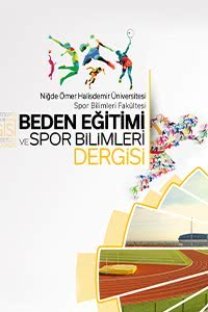Views of the academic personnel working in institutions giving sports training in higher education about electronic trade
Yükseköğretimde spor eğitimi veren kurumlarda görev yapan akademik personelin elektronik ticaret hakkındaki görüşleri
___
- 1. Argan. M., Ozer A., Akin E., Electronic Sports: Attitudes and Behaviors of Cyber Sporters in Turkey [Elektronik Spor: Türkiye’deki Siber Sporcuların Tutum ve Davranışları], Journal of Sport Management and Information Technology, Volume: 1, Number: 2, Electronic Journal, Page: 2, 2010.
- 2. Avsar. II., Cinkara E., Academic Staff's Internet Usage in the Process of Electronic Culture Transformation [Elektronik Kültür Dönüşümü Sürecinde Akademik Personelin İnternet Kullanımı], Model of Kyrgyzstan, Canakkale Onsekiz Mart University, Academic Information Conference, page. 481-485, 2008.
- 3. Coban. B., Devecioglu S., Karakaya YE., “E- Commerce in Sports Sector”[ Spor Sektöründe E-Ticaret], International Journal of Human Sciences [Link]. 7:2. Access: http://www.InsanBilimleri.com, Page: 1107, 2010.
- 4. Dogan. Z., Hasimoglu AB., A General Review on New Economy Concept and Electronic Commerce Concept Towards 2002 [2002 Yılına Doğru Yeni Ekonomi Kavramı Üzerine Genel bir Değerlendirme ve Elektronik Ticaret Kavramı], Kocaeli University, Faculty of Economic and Administrative Sciences, Department of Economics and Business Administration, I. National Information, Economy and Management Congress / Leaflet, Kocaeli, Page: 886, 2002.
- 5. Dolanbay. C., E-Commerce Strategy and Methods [E- Ticaret Strateji ve Yöntemleri], Sistem Publications, 1stEdition, Page: 34, 2000.
- 6. Elibol. H., Kesici B., “Electronic Commerce in Terms of Contemporary Business Management” [Çağdaş İşletmecilik Açısından Elektronik Ticaret], SelcukUniversity, Journal of the Institute of Social Sciences. Konya. Page: 310, 2004.
- 7. Ince. M., Electronic Commerce: “Facilities and Policies in Developing Countries”[ Gelişme Yolundaki Ülkeler İçin İmkanlar ve Politikalar], General Directorate of Economic Sectors and Coordination, Journal of the Department of Legal Measures and Institutional Arrangements, Ankara, Page: 1-2, 4, 1999.
- 8. Kalayci. C., “Electronic Commerce and Its Influences on SMEs”[ Elektronik Ticaret ve Kobi’lere Etkisi], International Journal of Economic and Administrative Studies, Year:1, Volume:1 Number:1, Page: 141, 2008.
- 9. Kalkova. R., Whiston. A., “Frontiers of Electronic Commerce”[Elektronik Ticaretin Sınırları], Reading Hill, pp. 22-32, 1996.
- 10. Kenneth. CL., Traver CG., E-Commerce [E-Ticaret], 2nd Edition, Addison-Wesley, USA, pp.19, 2004.
- 11. Kilicoglu. O., Web-Based Training Method whose Usage is Increased in In-service Training and An Application [Hizmetiçi Eğitimde Kullanımı Artan Web Tabanlı Eğitim Yöntemi ve Bir Uygulama], Marmara University, Institute of Social Sciences, Department of Business Administration, Post Graduate Thesis, Istanbul, Page: 1, 2007.
- 12. Kucukgorkey. A., New Economy and Electronic Commerce [Yeni Ekonomi ve Elektronik Ticaret], Kocaeli University,Faculty of Economics and Administrative Sciences,Department of Economics and Business Administration, I. National Information, Economy and Management Congress / Leaflet, Kocaeli, 2000.
- 13. Ogut. A Management in Information Age [Bilgi Çağında Yönetim], Nobel Publications, 2ndEdition, Ankara, Page: 47, 2003.
- 14. Pirnar. İ., E-Commerce in Tourism Industry [Turizm Endüstrisinde E-Ticaret], Journal of Economic and Social Researches, 1: 28-55, Page: 28, 2005.
- 15. Sarisakal. MN., Using of Databases in E-Commerce Applications [Veri Tabanlarının E-Ticaret Uygulamalarında Kullanılması], MNS Insurance Company Automation, I.U. Journal of Electrical & Electronics, Vol. 1, No. 1, pp. 41-48, 2001.
- 16. Sevindik. T., “Feedback Form of E-Commerce User” [E-Ticaret Kullanıcı Görüş Formu], 2010.
- 17. Strauss. J., Frost R., Marketing [Pazarlama], Second Edition, Prentice-Hall Inc., New Jersey, pp. 15, 2000.
- 18. Teo. TSH., Attitudes toward Online Shopping and the Internet [Online Alışveriş ve İnternete Karşı Tutumlar], Behavior & Information Technology, 21(4): 259-271, 2002.
- 19. Turban. E., King D., Introduction to E-Commerce [E- Ticarete Giriş], Prentice Hall: 3, 2003.
- 20. Vijayasarathy. LR., Predicting Consumer Intentions to Use Online Shopping: The Case for an Augmented Technology Acceptance Model [Online Alışveriş için tüketici niyetleri tahmini: Artmış Teknoloji Kabulü Modeline Yönelik Bir Durum] , Information and Management, 41: 747–762, 2004.
- 21. Yayli. A., Ozturk Y., Alabay MN., “A Research For Determining Levels of Internet Usage of Academics in Turkey” [Türkiye’deki Akademisyenlerin İnterneti Kullanım Düzeylerini Belirlemeye Yönelik Bir Araştırma], Gazi University,Journal of the Faculty of Commerce and Tourism Education, C:7, S: 2, page.259-277, 2003.
- 22. http://www.ecom.metu.edu.tr. Access Date: (15.04.2010, 13.05 pm), “Influences of Electronic Trade on Developing Countries and An Assessment on Turkey” [Gelişmekte Olan Ülkelerde Elektronik Ticaretin etkileri ve Türkiye Üzerine Bir Uygulama], İbrahim Güran YUMUŞAK.
- 23. http://www.basarm.com.tr/yayin/idarihukuk/eticaret/, Access Date: (10.11.2003, 10:20am).
- ISSN: 1307-6477
- Yayın Aralığı: Yılda 3 Sayı
- Başlangıç: 2007
- Yayıncı: Niğde Üniversitesi Beden Eğitimi ve Spor Yüksek Okulu
RAMİZ ARABACI, Salih ERDEN, Nimet KORKMAZ HAŞIL, Cemali ÇANKAYA, Faruk KORKMAZ
Determining the motivation level of the 25th winter Universiade human resources
M.Alparslan KURUDİREK, Emre BELL, DURSUN KATKAT, ADEM TÜZEMEN
A research on curiosity levels of physical education and sports teachers (Kayseri province sample)
Examination of scales in recreation area used in Turkey
Evren AĞYAR, Tennur Yerlisu Lapa
Rekreasyonel spor hizmetleri kalite ölçeği- 38’in Türkçe versiyonu geçerlik ve güvenirlik çalışması
Emine DEMIR KÖŞKER, Zafer ÇİMEN
ALİ SERDAR YÜCEL, YUNUS EMRE KARAKAYA, BİLAL ÇOBAN, Cemal GÜNDOĞDU, ÖZGÜR KARATAŞ
OĞUZ TÜRKAY, SEYİT AHMET SOLMAZ, ABDULMENAF KORKUTATA, ÇAĞRI ERDOĞAN
NAZMİ SARITAŞ, BETÜL COŞKUN, Cevat YAZICI, Serdar BÜYÜKİPEKÇ, KADİR YILDIZ, Mehmet YARDIMCI
Comparison of self-esteem scores of individual and team sport athletes and non- athletes
